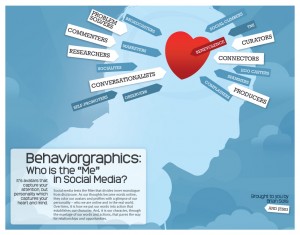Brain Solis rocks. In this post he tackles the 6 Pillars of Social commerce which he states are: 1: Social Proof – follow the crowd, 2: Authority – the guiding light, 3: Scarcity- less is more, 4: Liking – builds bonds and trust, 5: Consistency, 6: Reciprocity – pay it forward.
The 6 Pillars of Social Commerce: Understanding the psychology of engagement – Brian Solis
 Social media is about social science not technology. As such, its value is not realized in the Likenomics of relationship status nor in the scores individuals earn by engaging in social networks. The value of social media comes down to people, relationships, and the meaningful actions between them. As such, its value is measured through the exchange of social currencies that contribute to one’s capital within each network. Through conversations, what we share, and the content we create, consume and curate, we individually invest in the commerce of information and the relationships that naturally unfold. It is in how these relationships take shape that is both in and out of your control. This is why, in the age of social networking, relevant engagement counts for everything.
Social media is about social science not technology. As such, its value is not realized in the Likenomics of relationship status nor in the scores individuals earn by engaging in social networks. The value of social media comes down to people, relationships, and the meaningful actions between them. As such, its value is measured through the exchange of social currencies that contribute to one’s capital within each network. Through conversations, what we share, and the content we create, consume and curate, we individually invest in the commerce of information and the relationships that naturally unfold. It is in how these relationships take shape that is both in and out of your control. This is why, in the age of social networking, relevant engagement counts for everything.
One of the greatest myths in new media is that social networks facilitate conversations about you that would not otherwise take place if your organization weren’t present. As such, some business leaders believe that creating a presence in social networks eventually erodes the control of the brand, risking the governance they’ve theoretically held onto so triumphantly over the years. So, if that logic holds, by not engaging in social networks or by sharing only one dimension of your business online, you can control what people think and say. Well, this always seems to come as a surprise to those who think otherwise, but the truth is that new media did not “invent” conversations, experiences, or opinions. It seems imprudent and perhaps commonsensical to say, but, the truth is actually the contrary to popular belief.
Continues at: The 6 Pillars of Social Commerce: Understanding the psychology of engagement – Brian Solis.











